Zirconia Dental Implants
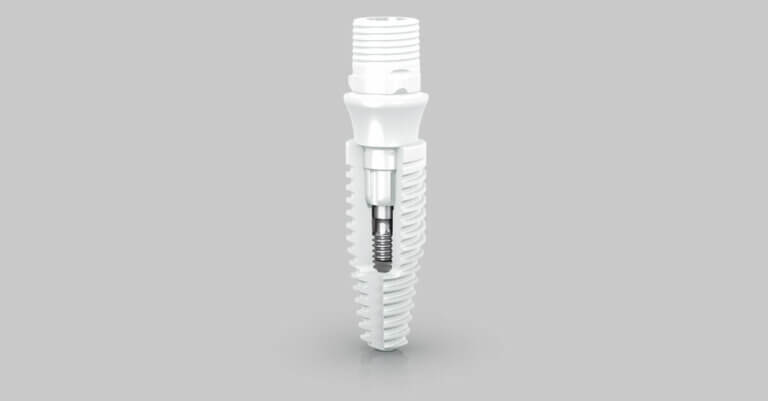
What Are Zirconia Dental Implants?
Zirconia dental implants are an alternative to traditional titanium dental implants for replacing missing teeth. Unlike titanium implants, which are made of 99.9% titanium metal, zirconia implants are made of a ceramic material called zirconium dioxide. Zirconia implants are known for their biocompatibility, durability, and aesthetic appeal. They are becoming an increasingly popular choice for those seeking a more metal-free option for dental implants.
Before you deciding on whether zirconia implants are right for you, there are some things you should know:
- Who Needs Zirconia Dental Implants?
- What Are The Advantages Of Zirconia Dental Implants?
- What Are The Potential Risks Or Complications Of Zirconia Dental Implants?
- How Much Does Zirconia Dental Implants Cost?
- What Are The Steps In The Zirconia Dental Implants Procedure?
- What Brand of Zirconia Dental Implants Do You Use?
- Can I Have Zirconia Dental Implants If I Am Pregnant?
- How Long Do Zirconia Dental Implants Last?
- What Are Common Problems with Zirconia Dental Implants?
If you have any further questions about zirconia dental implants or other dental services offered at Atlas Dental, please contact us.

Free phone consultation
Have questions about Zirconia dental implants? Schedule a free phone consultation with our Toronto dentist.

5 star google reviews
Our patients love us! See for yourself why people are choosing Atlas Dental in Toronto for Zirconia dental implants.

Zirconia dental implant Emergency Service
Are you having trouble with your Zirconia dental implants? Book an emergency appointment today.
Who Needs Zirconia Dental Implants?
Whether replacing a single tooth or multiple teeth, Zirconia dental implants are a suitable option for several types of patients. Here’s a breakdown of some reasons why someone might consider zirconia dental implants:
- Allergic to Metals: Some people may have a rare allergy to titanium or other metals used in traditional dental implants. In this case, zirconia dental implants are an excellent alternative because they are metal-free.
- Concerned about Aesthetics: Zirconia dental implants are white in color, which makes them more aesthetically pleasing than traditional metal coloured implants. They are an ideal choice for patients with delicate gums (a thin tissue biotype) and are concerned about the color of the implant showing through the gum tissue.
- History of Gum Recession: If a patient has a history of gum recession, the titanium implant may show through the thinning gum tissue, causing a grayish tint to the gum line. Zirconia implants do not cause this problem, making them a more suitable choice for these patients.
- General Health Concerns: Some patients may have systemic health issues that make them sensitive to metals or cause an increased risk of infection. In such cases, zirconia dental implants are often recommended due to their biocompatibility and lower risk of infection.
- Preference for Metal-Free Options: Many people prefer metal-free options for dental procedures. Zirconia implants provide a metal-free alternative to traditional dental implants, making them an ideal choice for those who prefer a more natural approach to dental treatment.
It is important to consult with your dentist at Atlas Dental to determine if zirconia dental implants are right for you.
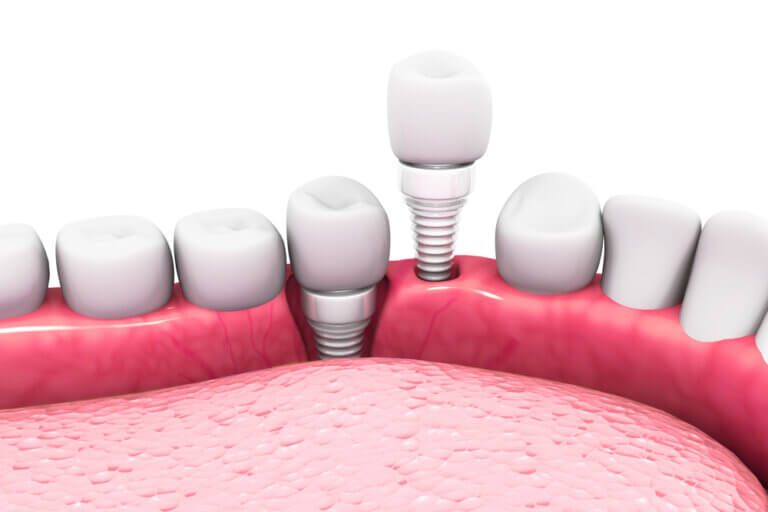
What Are The Advantages Of Zirconia Dental Implants?
There are many reasons why patients are choosing new zirconia dental implants instead of traditional titanium dental implants:
- Biocompatibility: Zirconia dental implants are biocompatible, meaning your body’s tissues will not treat the zirconia as an object foreign to itself. Therefore, the zirconia can fuse with the jawbone without causing inflammation or rejection.
- Durability: Zirconia dental implants are very strong and can last a long time with proper care. They are more resistant to fracture and chipping compared to traditional titanium implants.
- Aesthetics: Zirconia implants have a white color, which blends well with the natural teeth and gives a more natural-looking smile.
- One-Piece Design: Zirconia dental implants are often designed as a single piece, eliminating the need for a separate abutment. This design can reduce the risk of bacterial buildup and improve the overall longevity of the implant.
- No Corrosion: Zirconia dental implants do not corrode, which means they are resistant to damage from acidic or alkaline substances in the mouth. This resistance can reduce the risk of complications and prolong the life of the implant.
- Allergy-free: Zirconia dental implants do not contain any metal, making them an excellent option for patients who are allergic to metals.
Zirconia dental implants offer a range of advantages over traditional titanium implants. Your dentist can help you decide if zirconia dental implants are the right choice for you based on your individual dental needs and medical history. Contact us for more information
What Are The Potential Risks Or Complications Of Zirconia Dental Implants?
Zirconia dental implants are relatively new to the market and there are several potential risks or complications to consider:
- Fracture Risk: Zirconia dental implants may have a higher risk of fracturing compared to traditional titanium implants. While they are highly durable, zirconia implants are not as flexible as titanium, which may increase the risk of breakage if subjected to excessive pressure or stress.
- Limited Long-Term Data: Zirconia dental implants are a relatively new technology, and there is limited long-term data on their performance and success rates compared to traditional titanium implants. However, initial studies and clinical trials have shown promising results.
- Surgical Risks: Like all dental implant procedures, there are some risks associated with the surgical placement of zirconia dental implants, including peri-implantitis, nerve damage, and implant failure. These risks are the same for titanium dental implants as well. They can be avoided with proper planning, technique, and post-operative care.
It is essential to discuss any potential risks or complications of zirconia dental implants with your dentist before undergoing the procedure. Contact us for more information.
Cost of Dental Implant
A Dental Implant often involves multiple components and fees including tooth removal (code 71201), the dental implant placement (79931), bone grafting (72421) and the dental implant crown (27215). Therefore, depending on your needs, the cost of a single tooth dental implant can range between $4165 to $5222. The codes relevant to dental implants in the Ontario Dental Association’s Suggested Fee Guide appear as follows:
Removals, Erupted Teeth, Complicated
- 71201 – Removals, Erupted Tooth, Surgical Approach, Requiring Surgical Flap and/or Sectioning of Tooth: $307
Implants, Osseointegrated, Root Form, More than one component
- 79931 – Surgical Installation of Implant with Cover Screw – per implant: $1785+ Dental Materials Expense (approximately $350)
Alveolar Bone Preservation – Allograft
- 72421 – First tooth: $450 + Dental Materials Expense (approximately $300)
Crowns, Porcelain/Ceramic/Polymer Glass Fused to Metal
- 27215 – Crown, Porcelain/Ceramic/Polymer Glass Fused to Metal Base, Implant-Supported: $1280 + Dental Lab Fee + Dental Materials Expense (approximately $750)
In Ontario, most dentists will provide basic dental surgery and restorative dental services consistent with the Ontario Dental Association’s Suggested Fee Guide, such as dental emergency examinations, dental x-rays and tooth extractions, to ensure fair and competitive treatment cost. The Ontario Dental Association’s Suggested Fee Guide is a proposed fee structure that dentists in Ontario may or may not follow. Please consult with your dentist about fees before going ahead with treatment.
Each dental implant surgery case is unique. Depending on your unique circumstance, implant surgery may be more difficult and more expensive if any of the following is required:
- CBCT scanning
- Computer guided implant surgery
- Immediate implant placement following tooth extraction
- Bone grafting to prevent bone loss
- Bone regeneration to grow new bone
- Simultaneous gum graft procedures
- Immediate tooth replacement at the time of surgery
- Sinus lifting procedures to raise the maxillary sinus floor
Dental Implant services are usually considered a supplementary service by dental insurance plans and may or may not be covered by your dental insurance. Be sure to find out from your dental insurance plan provider how much you are eligible for before going ahead with dental treatment. Your dentist can help you submit an predetermination to your dental insurance.
For patients without dental insurance, Atlas Dental is pleased to offer dental financing through Dentalcard. Affordable payment plans start at 7.95% for terms of 6 months to 6 years. To learn more about Dentalcard dental treatment financing, follow this link.
What Are The Steps In The Zirconia Dental Implants Procedure?
Medical And Dental Examination
Before we start placing zirconia dental implants in Toronto, your dentist must do a thorough new patient exam to see if you are a good candidate. The dentist examines your medical and dental history, looks inside your mouth and takes a 2D x-ray image of the pre-surgical site. You may require a special 3D x-ray image called a Cone Beam CT scan to assess the amount and quality of bone at the proposed site. Insufficient bony foundation and support will require a grafting procedure called guided bone regeneration. Your implant dentist can decide to perform the dental implant surgery using computer-guided or free-hand methods.
Dental Implant Surgery
Before your visit, please read and follow our pre-operative instructions.
At the next appointment, the dentist or dental specialist such as oral surgeon or periodontist will numb the area with local anesthetic. If you require sedation, oral medications, nitrous oxide or IV sedation may be given. The dentist will check to make sure you feel no pain before the tooth extraction and performing the dental implant surgery. Successive drills are used to make the osteotomy gradually wider. After the final drill, the zirconia implant is placed, a healing cap is screwed on top, and the gums are sutured together. Three to six months may be required for healing and osseointegration with the surrounding bone. Sometimes, you need bone grafting to augment the bony foundation or gum grafting to improve the look of the gum line around the zirconia implant. In smile makeover cases involving the front teeth, the dentist may place a temporary crown at the time of the first surgery to make it appear like there is a tooth when you smile. The dentist may choose to bury the zirconia implant under the gum to allow for maximal healing, after which a second uncovering surgery would be required after four to six months. After receiving your dental implant, please read and follow our post-operative instructions to ensure proper healing.
Dental Implant Prosthesis
The next step is to make the final tooth prosthesis that sits on the dental implant called a crown or bridge. For this, the dentist or prosthodontist will take a 3D scan to capture the position of the implant in the periodontium. When the final crown returns from the dental lab approximately two to three weeks later, the dentist will secure it on top of the implant.
Maintenance Phase
Once you have finished your treatment, it is important to keep the implants and surrounding periodontal tissues clean and healthy. After the dental implant crown is placed, your dentist will provide post-insertion instructions on caring for your new restoration. This means regular hygiene cleanings and checkups with your dentist. The dentist will periodically take a dental x-ray to check on the health of the gum and bone. Without regular maintenance, you risk getting peri-implantitis, a condition where the implant is infected by bacteria that could lead to the failure and loss of the implant. Implant maintenance is a lifelong effort.
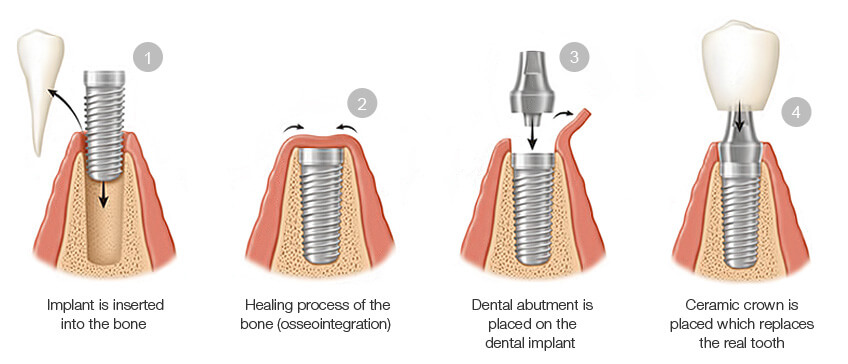
What Brand of Zirconia Dental Implants Do You Use?
At our dental practice, we use the Neodent® Zi Ceramic Implant System for patients who are looking for a safe and reliable tooth replacement option. This system is manufactured by Straumann, a leading dental implant company, and offers several benefits, including:
- Biocompatibility: The Neodent® Zi Ceramic Implant System is made of zirconia, a biocompatible material that is gentle on the gums and other oral tissues.
- Strength and Durability: Zirconia is a strong and durable material that can withstand the pressure of everyday use, making it an ideal material for dental implants.
- Aesthetic: The white color of zirconia closely resembles that of natural teeth, providing an aesthetic solution for those looking to replace a missing tooth.
- Clinically Proven: The Neodent® Zi Ceramic Implant System has been clinically proven to be a safe and effective solution for tooth replacement, with a high success rate and minimal complications.
- Comprehensive Solution: The system offers a complete range of implant sizes and restorative options, providing a comprehensive solution for patients with different needs.
The Neodent® Zi Ceramic Implant System is an excellent choice for those seeking a safe, effective, and aesthetically pleasing tooth replacement solution. If you have any questions about this system or would like to learn more about zirconia dental implants, please don’t hesitate to contact us.
Can I Have Zirconia Dental Implants If I Am Pregnant?
While there is limited research on the safety of dental implants during pregnancy, most dentists and oral surgeons recommend that elective dental procedures, including zirconia dental implants, be postponed until after the delivery. This is due to a number of factors, including the use of anesthesia and the potential risk of infection.
In general, it’s best to prioritize the health and safety of both the mother and the baby during pregnancy. If you have concerns about your dental health during pregnancy, it’s important to discuss your options with your dentist and obstetrician to determine the best course of action for you. Contact us for more information.
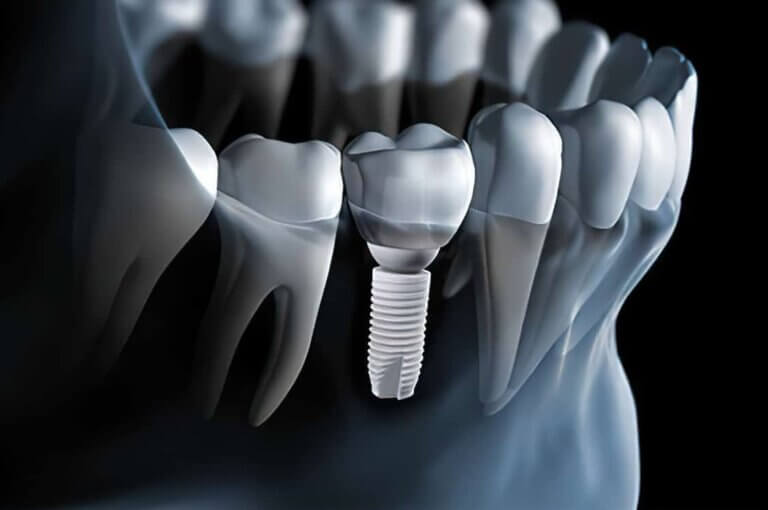
How Long Do Zirconia Dental Implants Last?
Zirconia dental implants are known for their durability and longevity, and with proper care, they can last for many years. In fact, some studies have shown that zirconia dental implants have a success rate of over 95% after 5 years and over 90% after 10 years.
The lifespan of a zirconia dental implant can depend on a variety of factors, including:
- Proper Oral Hygiene: Good oral hygiene is crucial in maintaining the health and longevity of your zirconia dental implant. Regular brushing, flossing, and dental check-ups can help prevent issues such as peri-implantitis and implant failure.
- Lifestyle Habits: Certain lifestyle habits, such as smoking, can increase the risk of implant failure. It’s important to avoid smoking or using tobacco products to ensure the longevity of your implant.
- Quality of Materials: The quality of the materials used in the implant procedure can also affect the longevity of the implant. High-quality zirconia materials and proper implant placement by a skilled dentist can help ensure the implant lasts for many years.
- Bone Health: The condition of the bone in the jaw can also affect the longevity of the implant. If the bone is strong and healthy, the implant is more likely to last for many years.
Overall, zirconia dental implants are a long-lasting and reliable option for tooth replacement. By maintaining proper oral hygiene and working closely with your dentist, you can ensure the long-term success of your implant. Contact us for more information.
What Are Common Problems with Zirconia Dental Implants?
While zirconia dental implants are generally safe and effective, there are some common problems that patients may experience, including:
- Implant Failure: Although uncommon, zirconia dental implant failure can occur due to a variety of reasons such as implant overload, implant fracture, or infection.
- Peri-implantitis: This is an inflammation of the tissue surrounding the implant, caused by the buildup of bacteria and plaque. If left untreated, peri-implantitis can lead to implant failure.
- Allergic Reactions: Some patients may have an allergic reaction to zirconia or the other materials used in the implant procedure, which can cause swelling, redness, and discomfort.
- Overloading of Implants: Overloading of implants refers to the pressure exerted on the implant during biting and chewing, which can cause implant fracture or failure. It’s important to follow a soft-food diet during the healing process and to avoid putting excessive pressure on the implant.
- Nerve Damage: Nerve damage can occur during the implant placement procedure and can result in temporary or permanent numbness or tingling in the mouth or face.
It’s important to note that while these problems can occur, they are generally rare and can often be avoided by working closely with an experienced dentist and following proper aftercare instructions. If you experience any discomfort or issues after receiving a zirconia dental implant, be sure to contact your dentist right away for evaluation and treatment.
We also think you’ll like…
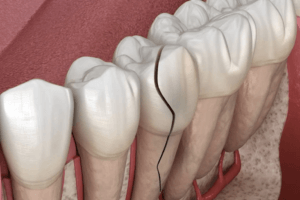
Crack Tooth Syndrome
Crack Tooth Syndrome What Is Crack Tooth Syndrome? Are you experiencing dental pain but your dentist has told you there is no obvious sign of
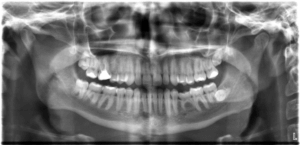
Panoramic X-Ray
Panoramic X-Ray What Is A Panoramic X-Ray Scan? A Panoramic X-Ray scan, also known as a Panoramic radiograph or orthopantomogram (OPG), is a specialized 2D
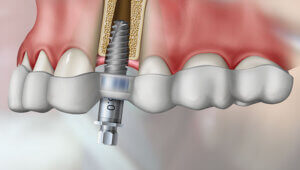
Computer Guided Dental Implant Surgery
Computer Guided Dental Implant Surgery What Is Computer Guided Dental Implant Surgery? Computer guided dental implant surgery is a specialized technique that employs advanced computer

Dental Pain Medication
Dental Pain Medication What Is Dental Pain Medication? Dental pain can range from a mild discomfort to intense throbbing, making even the simplest tasks unbearable.
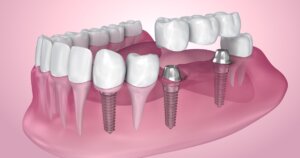
Dental Implant Surgery Informed Consent
Dental Implant Surgery Informed Consent I have been informed and afforded the time to fully understand the purpose and the nature of the implant surgery
Bicon Dental Implants
Bicon Dental Implants What Are Bicon Dental Implants? Bicon is a well-respected dental implant company known for its innovative approach to implantology and its unique

